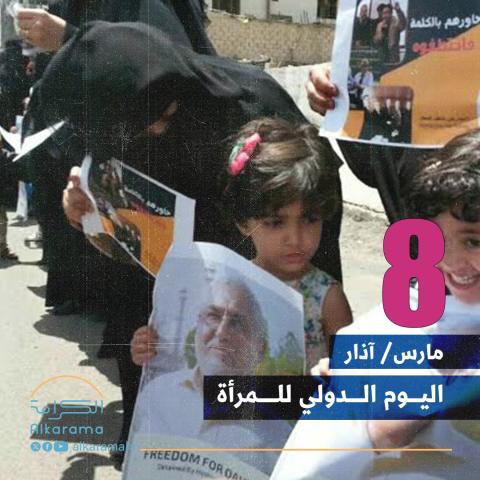
Every year on this date, the world celebrates International Women's Day, as established by the United Nations. This occasion serves as an important moment to highlight the status of women globally and to reaffirm the necessity of strengthening laws that uphold women's rights and ensure their protection from all forms of violence. The primary focus is often on physical violence, while psychological violence, which affects millions of women through human rights violations worldwide, remains overlooked. These violations may be inflicted upon them directly or indirectly as wives, mothers, sisters, and daughters of victims of arbitrary detention, torture, and enforced disappearance.
In the Arab world, women frequently endure the consequences of oppression, repression, and human rights violations perpetrated by authorities against men, particularly the deprivation of liberty. The ordeal begins from the moment victims are arrested without their families being informed of their detention, whereabouts, or the reasons for their arrest. This suffering extends to the relentless search undertaken by women for their husbands, sons, or relatives held in state prisons, in addition to the burden of providing for their families throughout an ordeal that may last for years.
The situation worsens in conflict zones, where women are directly targeted through killings, terror, and sexual violence, leading to displacement, homelessness, legal vulnerability, and economic and social hardship, as seen in Gaza, Sudan, Yemen, and Syria during the previous regime.
The Case of the Algerian Prisoner Djamel Eddine El-Askari
At the end of January 2025, the wife of Algerian detainee Djameleddine Laskri passed away. He had been arrested in the summer of 1992 and prosecuted by a special court established by the military regime following the January 1992 coup. The legal proceedings against him failed to meet even the most basic fair trial guarantees, and to this day, he remains in detention. In 2014, Alkarama brought his case before the United Nations Working Group on Arbitrary Detention, which subsequently issued Opinion No. 17/2014, deeming his detention arbitrary and calling upon Algeria to release him unconditionally and grant him appropriate compensation. However, Algerian authorities have yet to comply with this request.
The wife of Djameleddine Laskri epitomized the suffering and resilience of women living under regimes that systematically violate human rights. Her husband had been imprisoned for 33 years, leaving her to endure unimaginable hardships while raising their infant son alone and remaining a devoted and unwavering spouse. She visited her husband regularly in the various prisons to which he had been transferred, until she passed away at the beginning of this year. This courageous woman persevered for over three decades in her fight for her husband's release. In 2014, she declared: "I have exhausted all legal avenues and knocked on every door, yet the only response I have received is the silence of the authorities."
